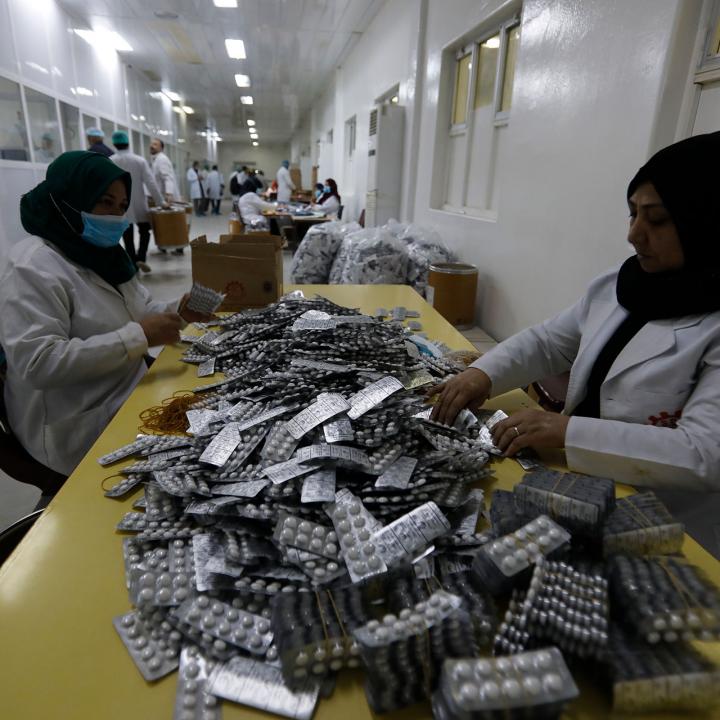
- Policy Analysis
- Fikra Forum
Iraq’s Health System: Another Sign of a Dilapidated State

Entrenched corruption in Iraq's health system is costing people their lives.
Iraqis are mourning the death of at least 108 patients after an explosion in a hospital located in Dhi Qar province, the second such incident in three months. The explosions in both Dhi Qar and Baghdad are the tragic result of decades of corruption and mismanagement by successive governments. Moreover, if the reaction to the previous explosion gives any indication, there will not be substantial changes to the status quo. Unfortunately, Iraq’s health sector will only continue to deteriorate as immediate political and economic reforms are unlikely. As a result, more Iraqis will fall victim to their government’s failure to improve the health system.
The deterioration of Iraq’s health system has been decades in the making, beginning after Iraq’s invasion of Kuwait and continuing into the present. The embargo on Iraq after the invasion resulted in the lack of medicine and the subsequent deaths of thousands of Iraqis due to simple medical conditions, such as common infections and diarrhea. Lack of access to medical supplies was amplified by the Saddam Hussein regime’s manipulation of the oil-for-food program, leading to a further deterioration of the health system. Moreover, many doctors and specialists left the country in the hope of finding a better life as sanctions bit hard during the 1990s and the Saddam Hussein regime slashed the budget of the health ministry. Some estimate that between 1993 and 2003, the funding of healthcare Iraq decreased as much as 90%.
The situation degraded further after 2003; the new political system did not bring a new reality to Iraq’s health system. A report two years after the U.S.-led invasion found that within the Iraqi healthcare system, “bribery, nepotism and theft are rife, with the problem so serious that the health of patients is suffering.” There was widespread theft of medicine, medical equipment, and frequent cases of fraud, which meant that hospitals struggled to maintain stocks of medicines.
By 2004, the health sector was in a dire situation, and the expectations of the Iraqi people for the new government could not be met because the status quo was very difficult to reform. For instance, the state did not keep pace between the increase of the population and the provision of necessary social services. Iraq’s population increased from 7.28 million in 1960 to 39 million in 2019, yet according World Bank statistics, hospital beds per person have actually decreased between 1980 and 2017, from 1.9 beds for every 1,000 Iraqis to just 1.3.
Corruption has played a major role in this ongoing collapse of infrastructure. Iraq is one of the most corrupt countries in the world according to Transparency International, and this naturally extends to the health system as well. Regardless of what percentage of Iraq’s GDP is allocated to the health sector, the rampant corruption makes any attempts at investing in the sector futile. Likewise, the corruption within the Health Ministry affects its ability to implement tangible changes. In fact, the Iraqi government actually impedes providing better health care for Iraqis in both the public and private sectors. There is fierce competition between Iraqi politicians to win the Health Ministry because this ministry allows its holder to embezzle money from medicine contracts. There is also evidence presented in U.S. courts against companies that bribed the Health Ministry to win contracts. In fact, the Iraqi government and the Health Ministry are accused of selling medicine intended to the ministry on the black market. As such, when COVID-19 spread in the Middle East, the Iraqi government and society were caught underprepared.
Despite declarations by Prime Minister Mustafa Al-Kadhimi that the government would prioritize tackling the COVID-19 crisis, Iraq failed to contain its spread, and many Iraqis feel that the government still does not have a clear strategy in this regard. While many countries were unprepared for the pandemic, Iraq is suffering more because of its dilapidated health system. COVID-19 cases in Iraq have reached 1.4 million, including at least 17,000 fatalities, and the numbers could be much higher because official numbers are unreliable. As COVID-19 reached Iraq, the lack of hospitals, equipment, and labs was evident; by some estimates Iraq is in desperate need of more beds than are currently in intensive care units. In fact, the government’s policies exacerbated the situation; it pressured the country’s medical workers to work in unacceptable conditions leading to infections among a large percentage of medical staff. However, the two recent explosions in Iraqi hospitals also clearly demonstrate how the corruption, mismanagement, unpreparedness, and the inability to reform health care have failed Iraqis—both were built impromptu to address Iraq’s medical shortcomings, and both were constructed with shoddy building materials and a lack of basic safety measures. Looking ahead, the overall state of healthcare in Iraq means that more unfortunate accidents will take place.
Improving the healthcare system is intrinsically tied to increasing efficiency and fighting corruption, two policies that the Iraqi government has failed to enforce since 2003. Change is very difficult in today’s Iraq simply because the forces that are responsible for the morbid conditions are not only the forces in power in the country, but are also the same ones benefitting from these conditions. The corrupt and elected politicians and health officials who maintain their positions are, rather than pushing for reform, taking advantage of the current situation to enrich themselves.
Given this reality, the Iraqi citizen is unable to challenge the corrupt nexus that formed over this decades-long period. At present, the country is facing a longstanding health crisis that will certainly worsen in following months and years. Unfortunately, while the incidents in Baghdad and Dhi Qar highlight the dire conditions of the Iraqi health system, they will not pave the way for meaningful change. Rather, Iraqis will continue to suffer because of ineptitude.


